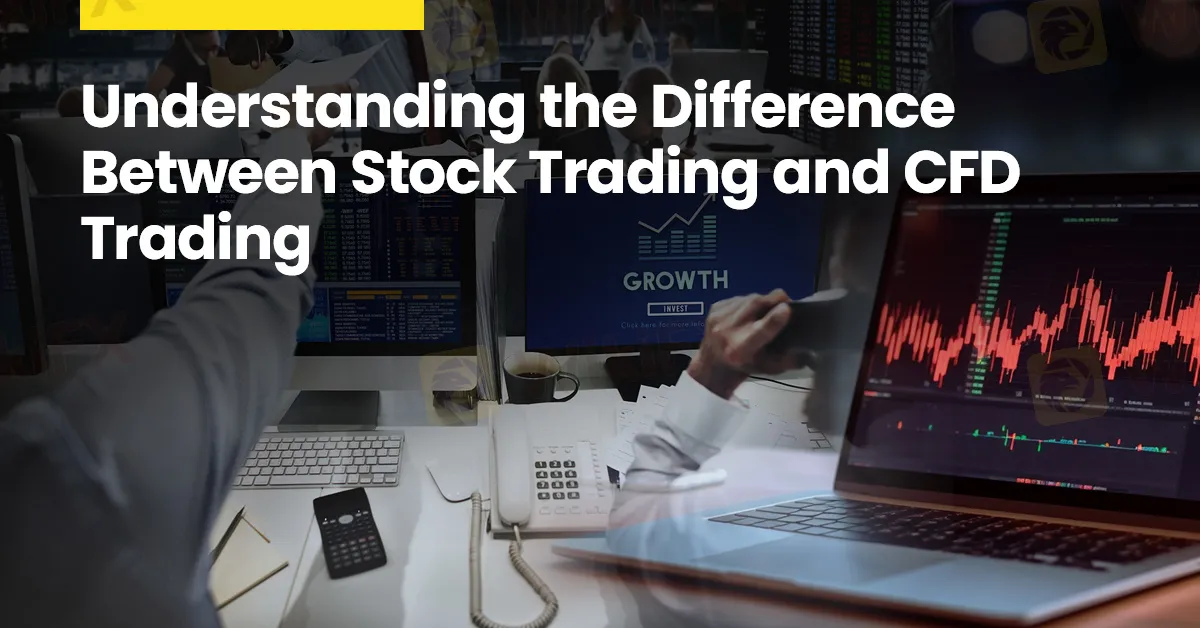简体中文
繁體中文
English
Pусский
日本語
ภาษาไทย
Tiếng Việt
Bahasa Indonesia
Español
हिन्दी
Filippiiniläinen
Français
Deutsch
Português
Türkçe
한국어
العربية
Understanding the Difference Between Stock Trading and CFD Trading
Abstract:In the dynamic world of online trading, two popular methods have emerged as favourites among traders: stock trading and trading Contracts for Difference (CFDs). This article will explain the differences between these two trading methods thoroughly.

In the dynamic world of online trading, two popular methods have emerged as favourites among traders: stock trading and trading Contracts for Difference (CFDs). While both offer opportunities to profit from market movements, they differ significantly in mechanics, risks, and potential rewards. Understanding these differences is crucial for any trader looking to navigate the financial markets effectively.

Stock trading involves buying and selling shares of publicly listed companies. When you purchase a stock, you own a portion of the company, entitling you to a share of its profits and voting rights at shareholder meetings. For instance, if you buy shares of Apple Inc., you become a partial owner of the tech giant and can benefit from its growth and dividends.
Stock trading offers several advantages, including ownership and dividends, as owning stocks means holding a stake in a company, with many companies paying dividends that provide a steady income stream. It also offers long-term growth potential, as stocks can appreciate significantly over time, and benefits from regulation and transparency, ensuring a high degree of investor protection. However, stock trading also has its drawbacks: it requires substantial capital, especially for high-priced shares, is limited to market hours which can restrict trading flexibility, and realizing significant returns can take a long time, depending on market and economic conditions.

CFDs, or Contracts for Difference, allow traders to speculate on the price movements of various financial instruments without owning the underlying asset. A CFD is a derivative product where you agree to exchange the difference in the asset's price from the moment you open the contract to when you close it. For example, if you believe Teslas stock price will rise, you can buy a CFD on Tesla shares. If the price goes up, you profit from the difference; if it falls, you incur a loss.
CFD trading offers several advantages, including leverage, which allows traders to control a large position with a relatively small amount of capital, thereby amplifying potential returns. It also provides market access, enabling traders to access a wide range of markets, including stocks, commodities, forex, and indices, from a single platform, and flexibility, as CFDs can be traded around the clock, offering greater flexibility compared to traditional stock markets. However, CFD trading also has its drawbacks: it involves high risk, as leverage can amplify losses and traders can lose more than their initial investment, there is no ownership of the underlying asset, meaning traders do not benefit from dividends or ownership rights, and it often comes with higher fees and spreads, which can eat into profits.

Imagine you have $1,000 to invest. In stock trading, you decide to buy shares of Microsoft at $250 per share. You can buy four shares. If Microsofts stock price increases by 10% to $275, your investment is now worth $1,100, giving you a $100 profit.
In contrast, with CFD trading, you could use leverage (e.g., 10:1) to control a $10,000 position in Microsoft with your $1,000. If Microsofts stock price rises by 10%, the value of your position increases to $11,000, netting you a $1,000 profit. However, if the price drops by 10%, you lose $1,000, potentially wiping out your entire investment.
In summary, both stock trading and CFD trading offer unique advantages and risks. Stock trading is ideal for those seeking ownership and long-term growth, while CFD trading appeals to those looking for flexibility and the potential for higher returns through leverage. Understanding these differences and carefully considering your risk tolerance and investment goals is essential to making informed trading decisions in todays financial markets.

Disclaimer:
The views in this article only represent the author's personal views, and do not constitute investment advice on this platform. This platform does not guarantee the accuracy, completeness and timeliness of the information in the article, and will not be liable for any loss caused by the use of or reliance on the information in the article.
Read more

Seaprimecapitals Withdrawal Problems: A Complete Guide to Risks and User Experiences
Worries about Seaprimecapitals withdrawal problems and possible Seaprimecapitals withdrawal delay are important for any trader. Being able to get your money quickly and reliably is the foundation of trust between a trader and their broker. When questions come up about this basic process, it's important to look into what's causing them. This guide will tackle these concerns head-on, giving you a clear, fact-based look at Seaprimecapitals' withdrawal processes, user experiences, and trading conditions. Most importantly, we'll connect these real-world issues to the single most important factor behind them: whether the broker is properly regulated. Understanding this connection is key to figuring out the real risk to your capital and making a smart decision.

iFX Brokers Review: Do Traders Face Withdrawal Issues, Deposit Credit Failures & Free Coupon Mess?
Have you had to pay several fees at iFX Brokers? Had your trading profit been transferred to a scamming website, causing you losses? Failed to receive withdrawals from your iFX Brokers trading account? Has your deposit failed to reflect in your trading account? Got deceived in the name of a free coupon? Did the broker officials not help you in resolving your queries? Your problems resonate with many of your fellow traders at iFX Brokers. In this iFX Brokers review article, we have explained these problems and attached traders’ screenshots. Read on!

NinjaTrader Exposed: Why Traders are Calling Out NinjaTrader’s Lifetime Plan & Chart Data
Did NinjaTrader onboard you in the name of the Lifetime Plan, but its ordinary customer service left you in a poor trading state? Do you witness price chart-related discrepancies on the NinjaTrader app? Did you have to go through numerous identity and address proof checks for account approval? These problems occupy much of the NinjaTrader review online. In this article, we have discussed these through complaint screenshots. Take a look!

World Forex Review: Does the Broker Deny Withdrawals and Scam Traders via Fake Bonuses?
Does World Forex prove to be a not-so-happy trading experience for you? Do you struggle to withdraw your funds from the Saint Vincent and the Grenadines-based forex broker? Do you witness hassles depositing funds? Failing to leverage the World Forex no deposit bonus, as it turned out to be false? These accusations are grabbing everyone’s attention when reading the World Forex review online. In this article, we have shared some of these. Read on!
WikiFX Broker
Latest News
Axi Review: A Data-Driven Analysis for Experienced Traders
INZO Regulation and Risk Assessment: A Data-Driven Analysis for Traders
GGCC Bonus and Promotions: A Data-Driven Analysis for Experienced Traders
Close Up With WikiFX —— Take A Close Look At Amillex
CapEx Spending On AI Is Masking Economic Weakness
Questrade Review Pros, Cons and Regulation
AccentForex Review: Is It Safe to Invest or Scam?
Cleveland Fed's Hammack supports keeping rates around current 'barely restrictive' level
Delayed September report shows U.S. added 119,000 jobs, more than expected; unemployment rate at 4.4%
The CMIA Capital Partners Scam That Cost a Remisier Almost Half a Million
Currency Calculator



